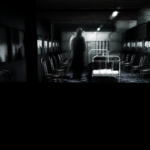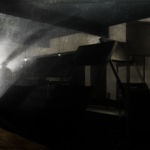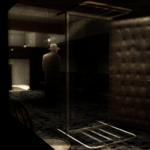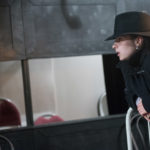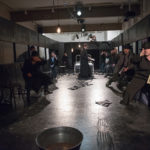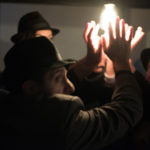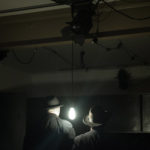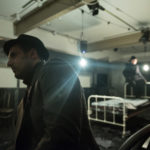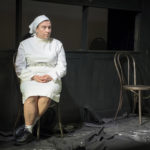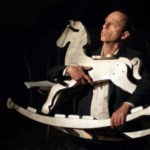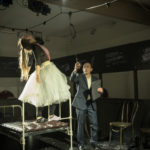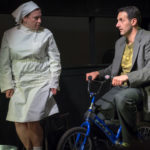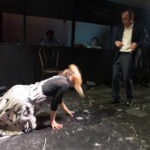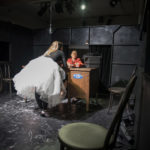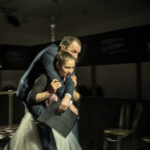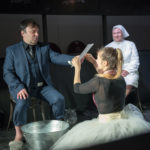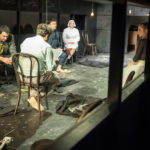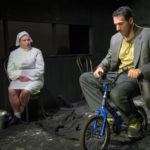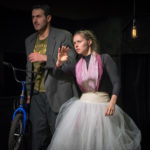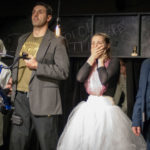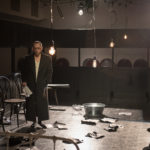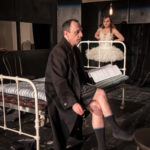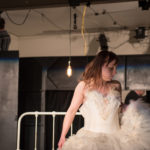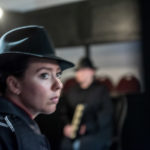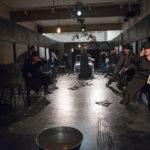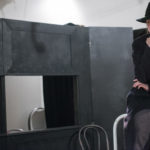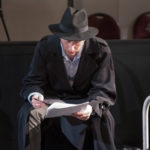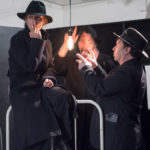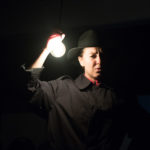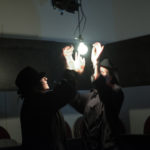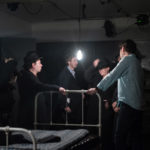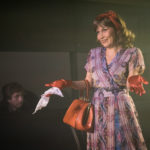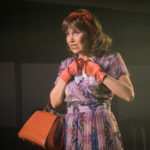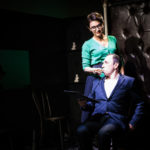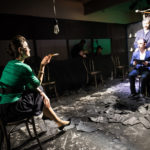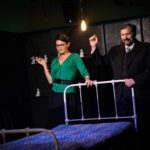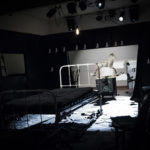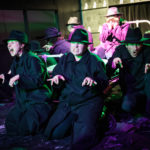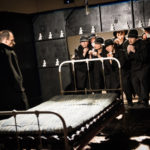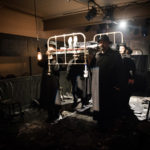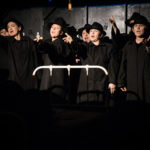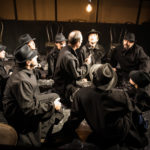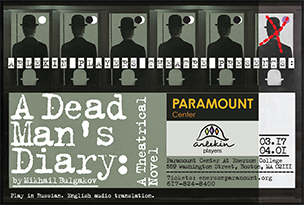
About
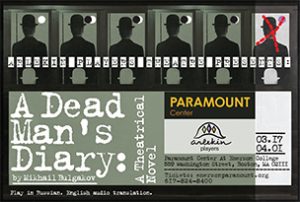 The unfinished “Theatrical Novel” by Mikhail Bulgakov (or “Dead Man’s Diary” – the preferred title of the author) is a sacred avowal of love to the theatre.
The unfinished “Theatrical Novel” by Mikhail Bulgakov (or “Dead Man’s Diary” – the preferred title of the author) is a sacred avowal of love to the theatre.
He wrote:
“What was more important, my life had been drained dry by love for the Independent Theatre; I was now pinned to it like a beetle to a piece of cork…”
It is a diary written by a scorned, full of love author that “throws himself headfirst off the Chain Bridge” as he meets the inexplicable, mysterious, comical, full of wonder world of Theatre.
Gallery
Video
Cast and Crew
Production Team
Cast:
Irina Danolova
Alla Gribov
Press Release
Press Contact: Marianna Golyak (617) 792-6962
or pr@arlekinplayers.com
Mikhail Bulgakov’s Dead Man’s Diary: A Theatrical Novel comes to life at the Emerson Paramount Center in Boston March 17 – April 1
NEEDHAM, MA: Arlekin Players Theatre is happy to announce, in collaboration with ArtsEmerson, a re-run of the stage version of Mikhail Bulgakov’s unfinished novel Dead Man’s Diary: A Theatrical Novel, a memoir that focuses on the author’s inexplicable, mysterious, and comical love of the world of theatre. Due to success of the performances in May, June and September, the new show will run March 17, 18, 24, 25, 30, 31, and April 1 at the Emerson Paramount Center in the Jackie Liebergott Black Box theatre. Performances are in Russian with audio-translation in English.
Dead Man’s Diary is based on Bulgakov’s own experiences at the famous Moscow Art Theatre of the 1920s and 30s, and reaches its comic height in a merciless lampooning of Konstantin Stanislavsky’s fashionable stage techniques. Full of affectionately drawn characters, it is a brilliant, absurdist tale of the exhilaration and black desperation wrought on one man by his turbulent love affair with the theatre. The play centers on a writer who fails to sell his novel, then fails when he attempts to commit suicide. When the writer’s play is taken up for production in a theater, literary success beckons, but he is not prepared to reckon with the grotesquely inflated egos of the actors, directors, and theater managers.
Directed by Igor Golyak, Dead Man’s Diary: A Theatrical Novel’s original stage composition is written by Golyak. The show features choreography by Victor Plotnikov, a stage design by Nikolay Simonov, an original score by Jakov Jakoulov, and a 15-member cast.
Dead Man’s Diary: A Theatrical Novel runs March 17 – April 1 at the Emerson Paramount Center in the Jackie Liebergott Black Box theatre, 559 Washington Street, Boston. Performances in Russian with English audio-translation. Tickets ($45/$65) are available by calling (617) 824-8400, or online at tickets@artsemerson.org.
* * * * * * * * *
Arlekin Players Theatre was created in Boston in 2009 and has since toured to New York, Chicago, and Hartford, as well as to several international festivals. Arlekin takes strong pride in their emphasis on self-identity; they are a company of immigrants performing works that play on the ideas of cross-culture, home, and traditions, challenging the idea of nationality, and finding common themes that unite us all. Performances are in Russian, with simultaneous translation into English. The company makes its home in Needham, MA. www.arlekinplayers.com.
About the Production Team
Mikhail Bulgakov was a Russian writer, physician and playwright active in the first half of the 20th century. He is best known for his novel The Master and Margarita, published posthumously, which has been called one of the masterpieces of the 20th century. In 1929, he had begun a novel, written in the form of letters, called For Secret Friend (also unfinished), addressed to his future wife Helen, which explains how he “became a playwright.” In 1930, For Secret Friend began to develop into a new novel, The Theatre, but in the same year he burned his initial sketches. Six years later, after his final break with Moscow Art Theatre, Bulgakov began writing a novel about the theatre. On the first page of the manuscript, he outlined two titles: A Dead Man’s Memoir and Theatrical Novel.
Igor Golyak graduated from the Schukin Theatre Institute in Moscow in 2002 with a specialization in acting. While attending the school, Igor acquired such awards as “Best Student Performance” at the Yaroslavl Theatre Festival for his role in The Portrait, and “Best Actor Award” in the Vienna Theater Festival for his role in the Diary of a Madman. Upon graduation, he was accepted to “Teatr u Nikitskih Vorot” and performed with the theatre for two years. At the same time, he acquired a professional teaching/ directing degree from the Russian Academy of Theatre Arts in Moscow. Igor has taught seminars at Wellesley College, Russian Academy of Theatre Arts/Middlesex University, Moscow Specialized Institute for the Arts, ARBOS Theatre Festival, New Art Studio, and Arlekin Studio in Needham. Currently Igor holds a position of Associate Professor of Theater at Boston Conservatory at Berklee.
Born in Kharkov City, Ukraine, Victor Plotnikov received his training at the Kiev-Ukraine School and the St. Petersburg Vaganova Ballet Academy. From 1987 to 1990, he was a soloist with Donetsk Ballet Company in the Ukraine. Plotnikov held principal dancer positions at Ballet Mississippi and Tulsa Ballet Theatre between 1990 and 1993, before joining Boston Ballet as a principal dancer in 1993, where he performed until 2006. He has danced major roles in extensive classical and contemporary ballets by many of the major choreographers, and has toured extensively in Russia and the U.S.
Award-winning designer Nikolay Simonov is a star of Russian theatre, coming from Moscow to design this production. A graduate of the scenery art faculty of the M. B. Grekov Art School in Rostov-on-Don, Simonov started working at the Theatre of the Young Spectator in Vologda, later moved to the Krasnodar Drama Theatre, and in 1990 continued on to the Rostov Academic Youth Theatre, where he worked as chief designer for 12 years. He is currently head of scenic design of the current Moscow Art Theatre.
Composer Jakov Jakoulov is an author of three ballets, ten instrumental concertos, music for over 20 theatrical, TV and cinema productions and numerous symphonic, chamber and choral works. In recent years his music has been presented by Verbier Music Festival (Switzerland), Boston Symphony Tanglewood Contemporary Music Festival, “Future Classics” Series with Dallas Symphony Orchestra, New European Strings Orchestra, Armenian National Symphony Orchestra, Jerusalem Symphony Orchestra, International Arts Festivals in Edinburgh, Avignon, and Cortona, “Kammerspille,” “Lilla,” Bachanalia Festival Orchestra, Fort Worth Symphony, Juilliard Orchestra, among others.
About Arlekin Players Theatre
In 2011, Arlekin’s production of Anton Chekhov’s “The Bear” was the winner of the New England Regional Festival in Concord, NH, selected to move on to the national level of competition in Rochester, NY that following June. Also in 2011, while participating in the Michael Chekhov International Theatre Festival, the company won the Best Director and Best Actress Award. The Company was a guest participant of the 2012 International Festival “Golden Lion” in Lviv, Ukraine, after which Arlekin was invited to perform its production of Alexander Pushkin’s “The Guest” at the Moscow Art Theatre School. Performed on one of the most admired stages in Moscow, the production was greeted with a standing ovation. In 2013, Arlekin was honored to represent the United States with their production of Anton Chekhov’s “The Bear” at the prestigious Mondial du Théâtre in Monaco, hosted by Prince Albert.
In 2016, the show “Natasha’s Dream” was invited to and took part in three international theatre festivals – United Solo Festival New York (Best Projection Design award), Moscow SOLO Festival, Russia (Where they shared the stage with Robert Wilson, Romeo Castellucci and Konstantin Raikin) and HighFest Yerevan, Armenia.
For more information about Arlekin Players Theatre, visit www.arlekinplayers.com.
Reviews
Theater Review: “Dead Man’s Diary” — Dare to Enter
In Needham, Arlekin Players — A Russian Theater Troupe — Build Artistic And Cultural Bridges
BWW Review: Dead Playwrights Tell No Tales? A DEAD MAN’S DIARY: A THEATRICAL NOVEL Will Convince You Otherwise
A theatrical dream from the Insant I walked into the lobby, kudos to Igor and his beautiful team of actors and designers for creating this unforgettable experience. Physical, whimsical, personal, communal theatre at its best. I will be back.
Synopsis
“Dead Man’s Diary” or “Theatrical Novel” is a poetic and satirical piece of literature. The inspiration for the creation of this masterpiece was the conflict between Bulgakov and the main director of the Moscow Art Theater, Stanislavsky, about the production of the play “The Cabal of Hypocrites.”
Another inspiration for the novel was a legendary thirty-year antagonism between Stanislavky and Nemirovich-Danchenko, co-founder of Moscow Arts theater in 1897. Stanislavsky served as a prototype of Ivan Vasilevich, and Nemirovich–Danchenko was a prototype of Aristrakh Platonovich.
Act I
A dream of his native city inspires Sergei Maksudov to write a novel. Upon completion of the work, Maksudov reads the novel to various writers and literary critics. All the listeners declare that the novel “will not pass censorship.” Maksudov decides to commit suicide.
One evening, an editor-publisher Rudolfi visits Maksudov’s apartment only to find him holding a gun to his head. The editor explains that he is aware of Maksudov’s novel and offers to publish it.
Maksudov is transported to another life, where he meets real literary writers, and he starts spending more time with them after the novel is published. After having visited one of the parties he realizes that the literary world is full of gossip and envy. There is no place for him. Maksudov falls sick with the flu. Upon recovery he goes to see Rudolfi but Maksudov learns that Rudolfi left for America a week ago and the entire publishing company ceased to exist.
Maksudov decides to write a new novel. Looking closely at the copy of his novel, Maksudov sees a magic stage that grows out of a white page; he hears a grand piano sound in the chamber; he observes the people described in the novel moving about.
Maksudov receives an invitation from Ilchin, a director of the Independent Theater. Ilchin informs Maksudov that he has read his novel and suggests Maksudov write a play. Maksudov admits that he has been working on the play already. Maksudov attends theater performances and immediately falls in love with the enchanted world of theater.
Having finished the play, Maksudov signs a contract for its production by the Independent Theater. Since he is overcome by happiness to produce his play, Maksudov ignores the unfair conditions of the contract. Shortly thereafter, he gets acquainted with Bombardov, one of the main actors of the theater. Bombardov takes Maksudov on a theater tour. Bombardov explains to Maksudov that there are two directors at the head of the Independent Theater: Ivan Vasilievich, who lives in Sivtsev Vrazhik, and Aristarkh Platonovich, now traveling in India.
Maksudov begins to work with Poliksena Toropetskaya, the secretary of Aristarkh Platonovich. While Toropetskaya types his play, Maksudov observes an intricate and often surreal life of the theater staff. Even though he is set to produce his play, Maksudov remains an outsider in the theater to which he desperately wants to belong.
Act II
Ivan Vasilyevich invites Maksudov to Sivtsev Vrazhek to read the play. Bombardov gives him instructions on how to behave, what to say, and most importantly – not to object to Ivan Vasilyevich’s statements about the play. Because the director does not like loud commotions on stage, Bombardov insists on Maksudov skipping the scene in which the main character kills himself with a gun.
During the meeting, Maksudov reads the play to Ivan Vasilievich, without following Bombardov’s advice. Ivan Vasilievich suggests that the play should be thoroughly altered. Maksudov tries to object, provoking Ivan Vasilyevich’s obvious displeasure. After the meeting, Maksudov is extremely upset. Bombardov tries to console his friend by explaining no one ever objects to Ivan Vasilyevich, no matter what he says.
Maksudov is invited to a meeting of the elders of the theater – ‘the founders” – to discuss his play. Maksudov understands that they do not like the play and they are not interested in playing it. On the contrary, says Bombardov, the founders really liked the play and they would like to play it, but there are no roles for them due to their age.
After a few months Maksudov receives a message announcing that the director Foma Strizh has begun to rehearse his play. Maksudov returns to the theater, feeling that he can no longer live without the stage, like a morphine addict without morphine.
When the rehearsals begin, once again Maksudov observes absurdity of the life behind the scenes. The more Maksudov witnesses the famous acting system created by Ivan Vasilievich, the more he realizes that the system is useless and does not apply to his innovative play.
Feeling desperate, Maksudov ends his life…


